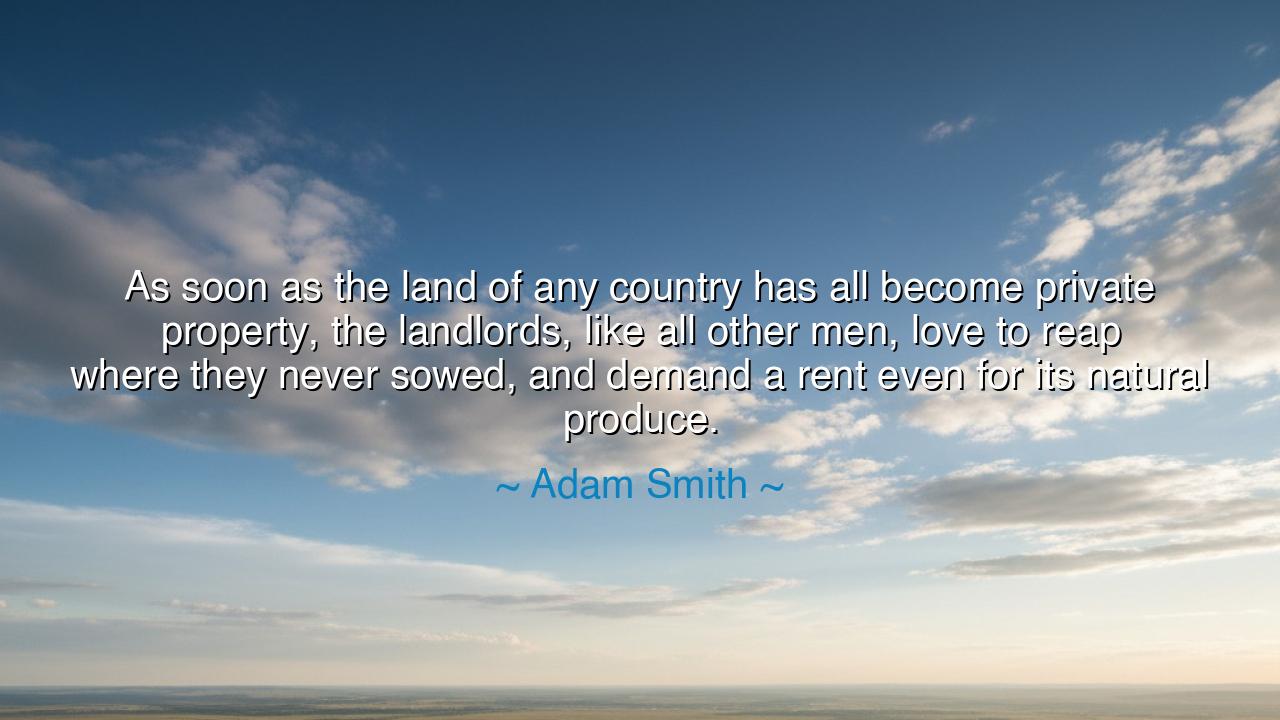
As soon as the land of any country has all become private
As soon as the land of any country has all become private property, the landlords, like all other men, love to reap where they never sowed, and demand a rent even for its natural produce.






“As soon as the land of any country has all become private property, the landlords, like all other men, love to reap where they never sowed, and demand a rent even for its natural produce.” Thus spoke Adam Smith, the philosopher of trade and industry, the keen observer of both the grandeur and the greed that dwell in human nature. In these words, he reveals not only an economic truth, but a moral one — that when the earth, which was once the common cradle of all life, becomes the possession of a few, a shadow falls over the balance of society. For land, the mother of all sustenance, was never meant to belong to man; rather, man belongs to the land.
Smith’s insight arises from the dawn of the industrial age, when the commons — the shared meadows and forests of Europe — were fenced, sold, and claimed by those who called themselves lords of property. The farmer who once walked freely upon the fields now bowed before the gate; the peasant who once gathered from the soil now labored for the right to touch it. Thus was born a new form of dependency — one not of chains or conquest, but of ownership disguised as order. The landlords, Smith observed, profited not from their labor but from their privilege. They sought to reap what they had not sown, drawing wealth not from creation, but from control.
The ancients would have recognized this danger well. In the time of Solon of Athens, the poor had fallen into slavery because of debt; the rich, owning all the land, had turned fields into fortresses. Seeing the ruin of his people, Solon decreed the Seisachtheia — the “shaking off of burdens” — freeing the enslaved and returning land to the many. He understood, as Smith did centuries later, that when a few claim the earth, the many lose not only livelihood, but dignity. Property, without compassion, becomes a god that devours the hands of those who till the soil.
And yet, Smith’s words are not the cry of envy, but the voice of justice and balance. He did not condemn the existence of property itself — for he knew that ownership, when justly earned and wisely managed, can build civilizations. What he condemned was exploitation without labor, wealth that feeds upon the toil of others without returning nourishment. The rent for natural produce he speaks of — the demand for payment simply to exist upon the earth — is the emblem of moral decay. It is when men forget that nature was never theirs to sell, but a gift entrusted to their stewardship.
Consider the story of the Highland Clearances in Scotland, a tragedy of the very land Adam Smith called home. In pursuit of profit, landlords evicted entire families from lands their ancestors had farmed for centuries, replacing them with sheep for the wool trade. Villages were burned, communities scattered, and the old songs of the Highlands fell silent. The lords reaped without sowing — and in doing so, they harvested sorrow. This, perhaps, is what Smith foresaw: that the greed of a few can dry up the well of life for all, and that a nation’s heart is not measured in gold, but in the fairness with which it shares its earthly blessings.
But Smith also reminds us of a deeper law — that of moral economy. For every age, whether feudal, industrial, or digital, faces the same choice: shall we serve profit, or principle? Shall the earth feed all, or only the fortunate? A wise society remembers that the bounty of the world belongs to all who labor, and that wealth divorced from responsibility is a burden on the soul. To reap without sowing is to grow nothing that lasts — no virtue, no peace, no legacy.
So, my child, let this teaching be written upon your heart: work should always walk beside reward, and compassion should stand guard over ownership. If you are given land, let it feed more than your hunger; let it nourish others. If you possess wealth, let it serve creation, not destruction. Remember always that to demand rent from what nature freely gives — the rain, the soil, the sun — is to steal from the very earth that sustains you.
For in the end, the land remembers. It remembers who tended and who took, who honored and who exploited. And when time has swept away the proud and the powerful, it is not the landlord’s name that endures, but the farmer’s seed, the laborer’s care, the humble hands that worked without greed. Let us, then, return to balance — giving back to the earth what we take, and sharing her gifts with those who labor beside us. For only then will we truly deserve the harvest of life, justice, and peace.






AAdministratorAdministrator
Welcome, honored guests. Please leave a comment, we will respond soon